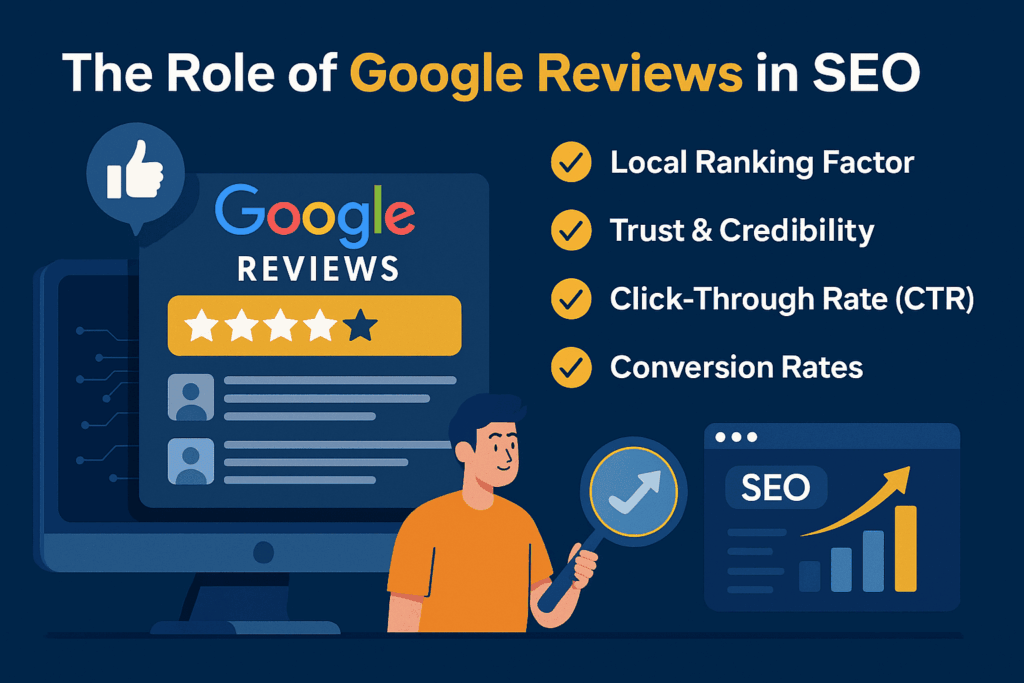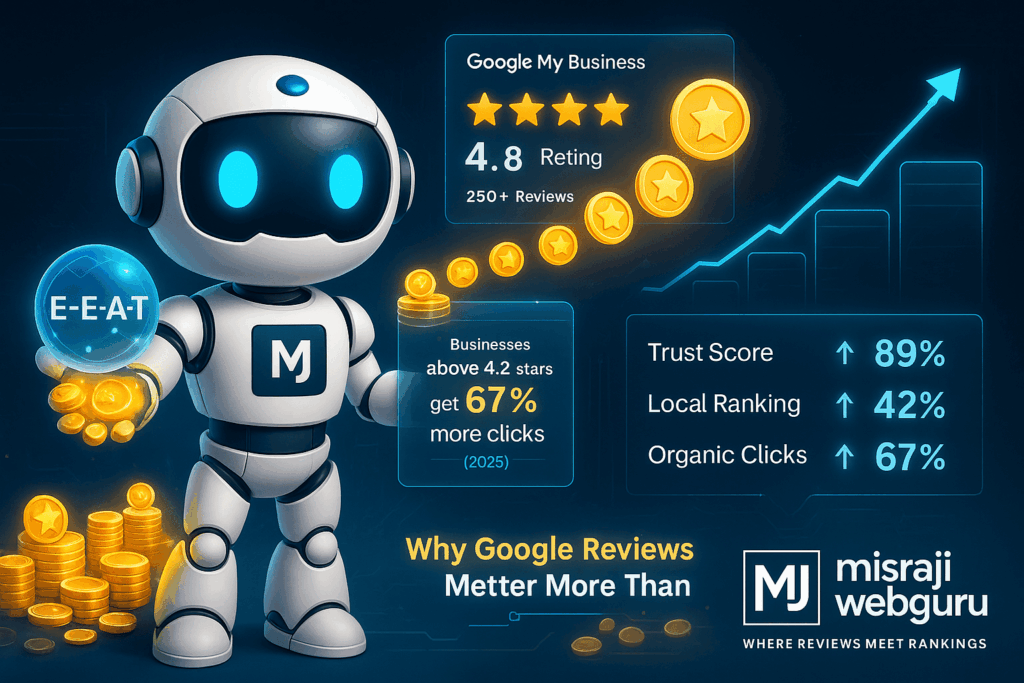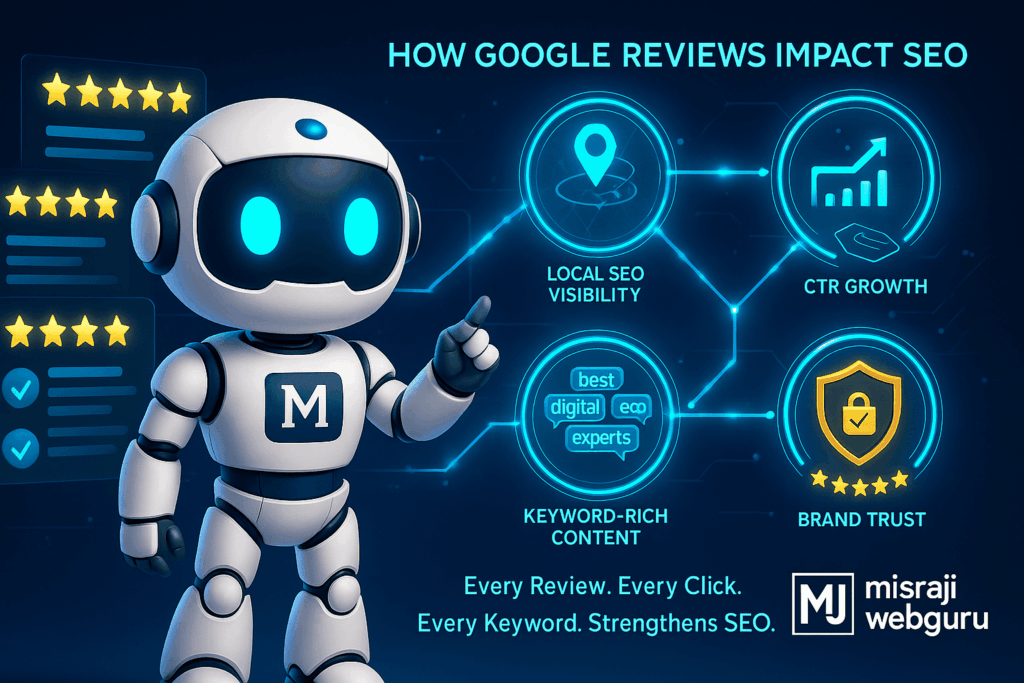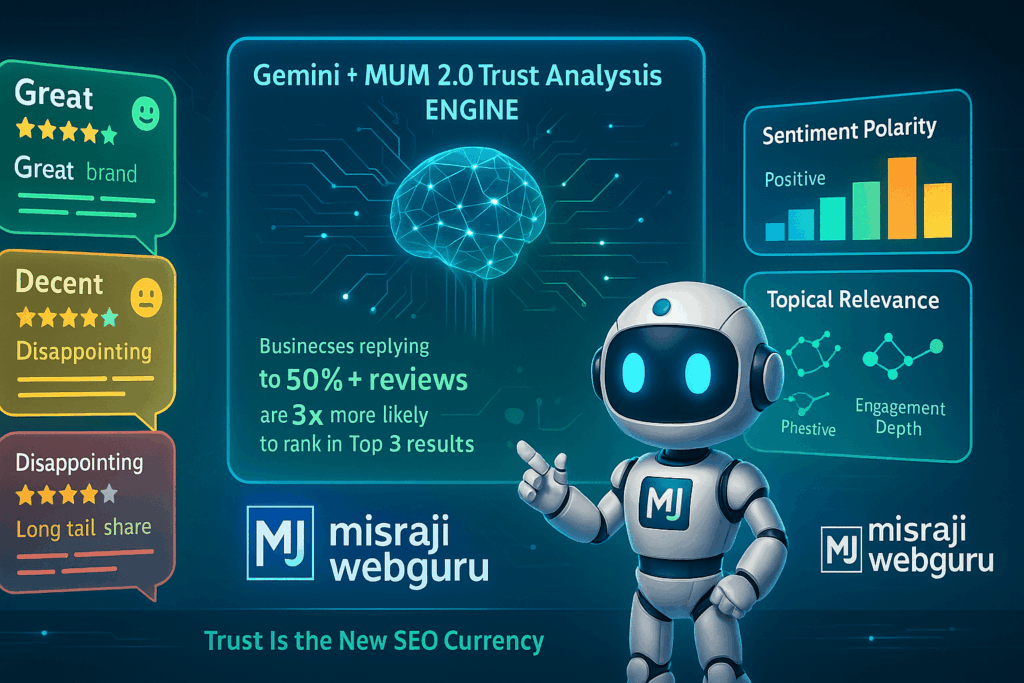
Table of Contents
Introduction
In 2025, Google Reviews have become far more than digital compliments or complaints — they are powerful ranking signals that influence how businesses appear on search results. Whether you run a small local shop or a global brand, your SEO performance now depends on how customers rate, review, and engage with you on Google.

Search algorithms today are increasingly behavior-driven. That means Google isn’t just scanning backlinks and keywords — it’s evaluating trust, credibility, and customer satisfaction. And what’s a better indicator of trust than real people sharing their experiences publicly?
At MisraJiWebGuru, we’ve studied hundreds of business listings and websites across industries. The findings are clear — companies that strategically manage their Google Reviews consistently outperform others in both local SEO and organic visibility.

1. Why Google Reviews Matter More Than Ever
Back in the early 2010s, reviews were merely social proof. Fast forward to 2025, and they’re an SEO currency.
Here’s why:

- E-E-A-T (Experience, Expertise, Authoritativeness, and Trustworthiness) has become Google’s core ranking principle. Reviews directly strengthen the “T.”
- Google My Business (GMB) integration now allows dynamic indexing of user-generated review content.
- Review signals (quantity, velocity, diversity, and sentiment) influence both local map rankings and organic SERP placements.
💡 Fact: A BrightLocal study (2025) found that businesses with an average rating above 4.2 stars receive 67% more clicks than those below 3.5.
2. How Google Reviews Impact SEO Rankings

a. Boosting Local SEO Visibility
Local SEO thrives on signals of proximity and relevance. Google Reviews send both. Each review adds context — keywords about your services, city names, and personal experiences that enrich your local profile naturally.
b. Increasing Click-Through Rate (CTR)
When users see star ratings next to your listing, they’re 28% more likely to click (according to HubSpot). CTR is a behavioral signal Google uses to determine relevance. More clicks → better engagement → improved ranking.
c. Enabling Keyword-Rich UGC (User-Generated Content)
Every customer review acts like mini-SEO content. Words your customers use often align with long-tail search queries. These keywords give Google more reasons to associate your business with relevant searches.
d. Strengthening Brand Trust
High review volume and consistent positivity tell Google that your business delivers value. The algorithm learns that recommending you is a low-risk, high-trust action.
3. The Science Behind Reviews and Algorithmic Trust
Google’s AI-driven ranking systems (Gemini + MUM 2.0) interpret reviews as real-world validation. The algorithm now measures:

- Sentiment Polarity (positive vs negative tone)
- Topical Relevance (alignment with core business keywords)
- Engagement Depth (review length, photo uploads, owner replies)
📊 Businesses that reply to more than 50% of reviews are 3× more likely to rank in the top 3 local pack results.
Google’s intent is simple: if you’re actively engaging with real customers, your SEO trust score increases.
4. How to Optimize Google Reviews for SEO
Step 1: Encourage Genuine Reviews
Ask customers politely right after purchase or service completion. Use QR codes, follow-up emails, or WhatsApp messages with direct links to your Google Review page.
Step 2: Respond to Every Review
Whether positive or negative, responses show responsibility. Use relevant keywords subtly while maintaining a conversational tone:
“Thank you for your kind words about our digital marketing services — we’re glad our SEO strategies helped your brand grow!”
Step 3: Diversify Review Content
Encourage customers to mention specific services or locations (“MisraJiWebGuru’s AI SEO audit helped our Lucknow office”). This strengthens geo-contextual SEO signals.
Step 4: Keep Review Velocity Consistent
Google favors steady review growth over sudden spikes. Aim for 5–10 new reviews weekly if your business has consistent traffic.
Step 5: Showcase Reviews on Your Website
Embed a review widget or testimonial slider. This creates schema-supported structured data that helps your website earn rich snippets in SERPs.
5. Schema Markup: Turning Reviews into SEO Assets
Schema markup (structured data) allows Google to understand your reviews better. When implemented correctly, it can display star ratings directly under your website link in search results.
Types of Review Schema to Add:
Product– for individual service reviewsLocalBusiness– for store or agency reviewsOrganization– for brand-level reputationFAQ– to supplement review data with questions users often ask
🧩 Tools like Rank Math SEO simplify schema setup for WordPress users, ensuring your reviews contribute directly to higher rankings.
6. Common Mistakes That Kill SEO Impact
Even genuine reviews can fail to help your SEO if mishandled. Avoid these pitfalls:
- ❌ Fake Reviews: Google’s AI easily detects review patterns and can penalize spammy activity.
- ❌ Neglecting Negative Feedback: A few bad reviews don’t hurt — ignoring them does.
- ❌ Copy-Pasting Replies: Duplicate responses reduce authenticity signals.
- ❌ Review Gating: Asking only happy customers for reviews is against Google’s policies.
7. Integrating Google Reviews into a Broader SEO Strategy
At MisraJiWebGuru, we approach reviews as strategic SEO assets, not vanity metrics.
Here’s our 3-layer system:
- Acquisition Layer: AI-based email and WhatsApp triggers ask for timely feedback.
- Engagement Layer: Smart response templates that include service keywords to enhance contextual SEO.
- Distribution Layer: API integration pulls reviews into web pages, boosting schema signals.
The result?
Clients often experience 15–25% organic traffic lift within 60 days of optimized review management.
8. Case Study: The MisraJiWebGuru Approach
Client: Local Retail Brand in Lucknow
Challenge: Strong services but poor online visibility.
Action:
- Enabled automated review collection via Google APIs.
- Used NLP sentiment analysis to categorize feedback.
- Embedded reviews on site using schema.
Results:
- +43% increase in organic impressions
- +27% higher conversion from local searches
- Average review rating improved from 3.8 to 4.6 within 3 months
🏆 Outcome: The brand entered the Top 3 Local Pack results for five major keywords.
9. The Future of Google Reviews and SEO
By 2026, Google is expected to introduce AI-moderated trust layers for reviews. These systems will verify authenticity through writing patterns, user histories, and cross-platform validation.
What this means for brands:
- Reviews will be even harder to fake.
- Personalized SEO scoring will become common — where user interactions, review engagement, and brand sentiment shape ranking individually.
- Voice Search Optimization will rely heavily on customer feedback (e.g., “Hey Google, find a highly-rated SEO agency near me”).
Your preparation today — building authentic review momentum — ensures resilience tomorrow.
10. Action Plan: Turning Reviews Into Rankings
To convert your review ecosystem into SEO power:
- Create a Google Review SOP (standard operating procedure).
- Integrate review data into your SEO dashboard (via GA4 or Looker Studio).
- Conduct a quarterly review audit to track sentiment trends.
- Train your team to respond using brand tone and SEO keywords.
- Partner with experts like MisraJiWebGuru for AI-assisted monitoring and growth.
FAQs: Google Reviews & SEO in 2025
1. How do Google Reviews affect SEO in 2025?
Reviews directly influence SEO rankings by improving local relevance, trust signals, and user engagement metrics that Google uses to evaluate business credibility.
2. Why are Google Reviews important for SEO performance?
Because Reviews enhance a brand’s online reputation, they increase click-through rates and help Google identify trustworthy, SEO-optimized businesses.
3. Can positive Google Reviews improve my website’s SEO ranking?
Yes. Positive Reviews send authority and trust signals to Google’s ranking algorithm, leading to higher visibility in local and organic SEO results.
4. Do negative Google Reviews hurt SEO?
While a few negative reviews don’t destroy rankings, consistent poor Reviews can harm SEO by lowering user trust and engagement rates.
5. How many Google Reviews do I need to impact SEO?
There’s no fixed number, but consistent growth in authentic Google Reviews improves SEO more than having hundreds of outdated or fake reviews.
6. Does responding to Google Reviews help SEO?
Absolutely. Google prioritizes active engagement. Replying to Reviews regularly signals to the algorithm that your business values customer experience — boosting SEO visibility.
7. How often should I ask customers for Reviews to maintain SEO ranking?
Aim for a steady flow — at least a few new Reviews each month. Google values freshness and activity, both of which strengthen SEO rankings.
8. Are keywords in Reviews important for SEO?
Yes. When customers naturally include keywords like your service or location in their Google Reviews, it boosts your SEO relevance for those search queries.
9. Can fake Google Reviews hurt SEO in 2025?
Yes. Google’s AI can now detect and penalize fake Reviews. Authenticity and consistency remain the best SEO strategies.
10. How do Google Reviews influence local SEO ranking?
Local SEO depends heavily on Google My Business signals. Frequent, high-quality Reviews with location relevance can drastically improve local map pack rankings.
11. What is the best way to collect Google Reviews for SEO improvement?
Encourage real customers post-purchase with easy links or QR codes. A steady stream of genuine Reviews builds lasting SEO benefits.
12. Do Google Reviews increase website traffic?
Yes. More positive Reviews attract clicks from users who trust your brand, indirectly improving SEO through higher engagement metrics.
13. How can small businesses use Google Reviews for SEO advantage?
By consistently gathering positive Reviews, small businesses can compete with larger brands and improve local SEO visibility without heavy ad spending.
14. Does review velocity affect Google SEO ranking?
Yes. Sudden spikes in Reviews may trigger spam detection, while consistent review growth signals healthy SEO performance.
15. Can Google Reviews improve E-E-A-T signals in SEO?
Definitely. Reviews contribute to Experience, Expertise, Authoritativeness, and Trustworthiness — the pillars of modern SEO in 2025.
16. How do Google Reviews affect mobile SEO results?
Mobile searchers rely on ratings and Reviews before visiting a site or store. High ratings increase mobile clicks and SEO engagement metrics.
17. Should I embed Google Reviews on my website for SEO?
Yes. Embedding live Reviews on your site increases user dwell time and provides fresh, relevant content that boosts on-page SEO.
18. What’s the best SEO tool to track the impact of Google Reviews?
Tools like Rank Math SEO, Ahrefs, and Google Business Insights allow you to monitor keyword shifts and local ranking improvements from Reviews.
19. Can AI help optimize Google Reviews for SEO?
Yes. AI tools can analyze sentiment, detect keyword gaps, and help craft better responses to Reviews — improving overall SEO strategy.
20. How can MisraJiWebGuru help improve my Google Reviews and SEO?
At MisraJiWebGuru, we combine AI-driven SEO strategies with authentic reputation management to grow your Reviews and elevate your SEO ranking.
Conclusion: The Review Revolution
In 2025, Google Reviews have become the heartbeat of SEO. They blend human authenticity with algorithmic precision.

At MisraJiWebGuru, we help brands transform customer feedback into measurable ranking power. Every star, every word, and every response counts — not just for reputation, but for visibility, conversions, and long-term growth.
🌟 Remember: Reviews aren’t the end of the conversation — they’re the start of your SEO story.



